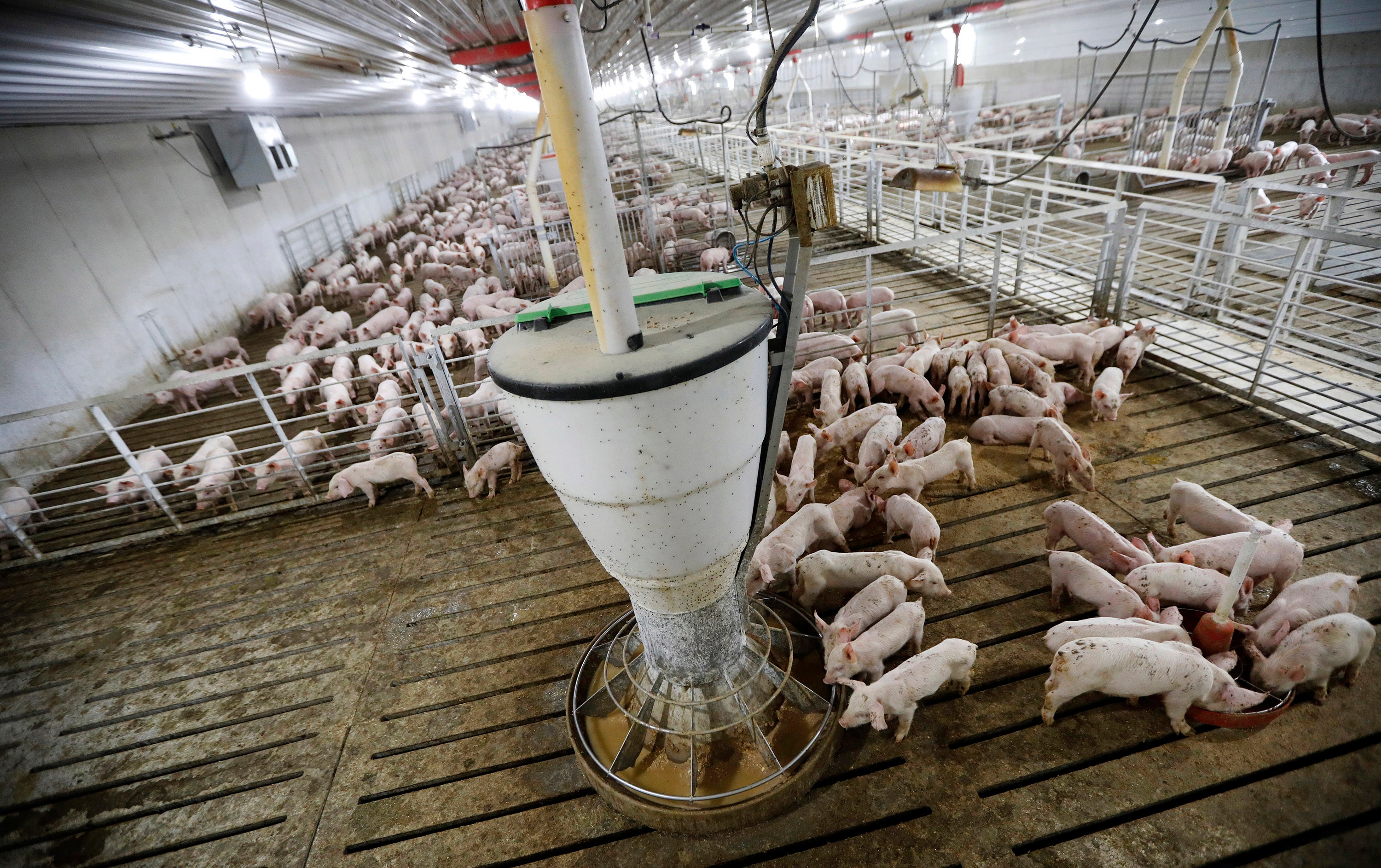Iowa court reverses precedent on Iowa pig farm lawsuits
The Iowa Supreme Court has reversed a longstanding precedent that allowed landowners to sue for damages when a neighboring hog farm causes water pollution or odor problems that affect quality of life

Your support helps us to tell the story
From reproductive rights to climate change to Big Tech, The Independent is on the ground when the story is developing. Whether it's investigating the financials of Elon Musk's pro-Trump PAC or producing our latest documentary, 'The A Word', which shines a light on the American women fighting for reproductive rights, we know how important it is to parse out the facts from the messaging.
At such a critical moment in US history, we need reporters on the ground. Your donation allows us to keep sending journalists to speak to both sides of the story.
The Independent is trusted by Americans across the entire political spectrum. And unlike many other quality news outlets, we choose not to lock Americans out of our reporting and analysis with paywalls. We believe quality journalism should be available to everyone, paid for by those who can afford it.
Your support makes all the difference.The Iowa Supreme Court on Thursday reversed a longstanding precedent that allowed landowners to sue for damages when a neighboring hog farm causes water pollution or odor problems that affect quality of life.
The court concluded, 4-3, that a 2004 decision was wrong.
The earlier ruling established that a portion of Iowa's law providing immunity to livestock farms from neighbors' nuisance lawsuits violated the inalienable rights clause of the Iowa Constitution. It also found neighbors could sue if they had lived in the area long before the farm began operating, had sustained significant hardship, and did not benefit from the nuisance immunity granted to the livestock farm.
Justice Thomas Waterman wrote in the Thursday decision that “protecting and promoting livestock production is a legitimate state interest, and granting partial immunity from nuisance suits is a proper means to that end.”
Iowa is the nation’s leading pork producer with 23 million pigs, most kept in large confinement buildings that collect nitrogen-rich manure from the animals and use it to fertilize fields.
The court said judges must use a rational basis to review future court challenges — a standard that will be difficult to overcome because it presumes state laws are passed for the benefit of the public.
The decision is a significant blow to property owners in rural areas who want to take legal action over expanding hog farms.
“Its going to make it more difficult. It was difficult anyway as it was,” said Wallace Taylor, the attorney representing landowner Gordon Garrison who bought 300 acres of land in Emmet County in northwest Iowa in 1972, built a home there in 1999, and was disturbed in 2015 when farmer Jay D. Moore built a 4,000-pig operation about half a mile away.
Garrison said he could smell its odor more than 100 days of the year, sometimes all day, and it caused him to experience nausea and dizziness that forced him to stop working outdoors. Other neighbors supported his complaints.
He also complained of water pollution caused by manure spread on adjacent farm fields.
Garrison sued in 2020, calling the hog farm a nuisance. A district court judge dismissed his lawsuit in May 2021 and he appealed.
Waterman wrote Thursday that balancing the competing interests of hog farmers and neighbors “is a quintessentially legislative function involving policy choices our constitution places with the elected branches.”
Under the ruling, property owners can sue when the damage results from a farm’s failure to comply with a federal or state law or regulation, or when the farmer failed to use prudent and generally accepted management practices.
“The Iowa Supreme Court restored the Iowa legislature’s role in striking a balance between the right to farm and the impact on those who choose to live in rural Iowa,” said James Pray, the lawyer who represented Moore.
The Iowa high court has six conservative justices appointed by Republican governors and one Democratic appointee. Last Friday, the court overturned its 2018 decision that guaranteed Iowans the fundamental right to abortion under the state constitution.
Justices Brent Appel and Christopher McDonald wrote in dissenting opinions that they would have upheld the 2004 case that provided for hog farm challenges. Justice Dana Oxley agreed.
Appel said the purpose of the inalienable rights clause in the bill of rights is to ensure that individual liberties are not subject to erosion by an aggressive legislative or executive branch.
“Are we telling the existing property owners that they are required to ‘take one for the team’ as the private owners next door emit nuisance odors under a scheme of statutory immunity?” he wrote.
McDonald said Iowa’s law immediately deprives a property owner of the right to assert a private nuisance action and seek full compensation, and that other states allow time for neighboring landowners to sue.
“In the end, the legal question presented in this case is a simple one: does the constitution mean what it says? Do the men and women of this state have the constitutional right to protect their property? The text of the constitution, precedent, and history say yes. The majority says no,” he wrote.
Taylor said Iowans need to elect legislators who will rein in the livestock industry, who will listen to their concerns and repeal the nuisance immunity law for hog farms.